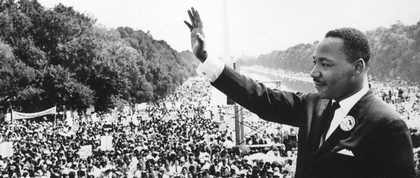
Dear Colleagues and Students:
I vividly remember walking down the row of National Guards who held back the ranting, jeering crowds of people with faces full of anger. I wondered how adults could be so filled with hate about children attending a “public school.” I felt apprehension and fear as the guards protected us from the crowds, their guns drawn, and I wondered if we would live through this moment. That event, and many more like them, shaped my life and the lives of my friends at that time.
As I grew up in segregated Cleveland, the work of the Rev. Dr. Martin Luther King, Jr. represented the hope of a nation for all. We felt that we could endure and rise above the hate-filled moments until a time came when the hatred would no longer exist. He had a dream, and many of us took on that dream as well.
It’s been more than half a century since Dr. King was murdered in Memphis, TN, having died hours after giving his famous “I Have a Dream” speech. He was there to bring national attention to the poor working conditions and low wages of striking sanitation workers. In his later years, his message embraced a much broader, bolder vision for the country. He spoke of linking the civil rights campaign with an anti-poverty crusade that would embrace race, class and gender under one umbrella. He joined welfare rights with civil rights, and connected the struggles of farm workers, Native Americans and poor whites. He spoke out against the war in Vietnam. Significantly, his message began to focus on our commonalities rather than our differences.
We cannot know where Dr. King’s message of justice and equity would have taken him had he lived, but clearly he became more critical of the systems that support and underlie divisiveness and breed discrimination. I recently scanned through a black history book and looked at the signs carried by the striking sanitation workers of 51 years ago that read simply “I Am a Man.”
I’d like to be able to say that in 51 years, Dr. King’s dream has been fulfilled and that conditions have significantly improved. But the reality is that while some progress has been made, we still have a long way to go. Sometimes it even seems that each year we have not defeated discrimination and hatred, the roots of that hatred grow deeper.
Indeed, we are living in a climate where anyone displaying normative differences risks being met with exclusion -- or worse yet, being bullied. I don’t doubt that Dr. King would be disappointed to know that decades later, even after the election of the first black president of the United States, we still have to march and rally against injustice. The signs of 51 years ago have been replaced with others reading “Black Lives Matter,” “All Lives Matter,” “I Can’t Breathe” or “Hands Up, Don’t Shoot.”
Yet, a half century after Dr. King’s assassination, we can identify points of progress sprinkled between continued injustices. During the tenure of President Barack Obama we saw some of the highest rates of incarceration among black and brown people than under any previous president. We also saw the deaths of Michael Brown, Freddie Gray and Trayvon Martin, which ushered in urban unrest reminiscent of the 1960s.
Our University has been actively examining its social climate and policies. Two years ago, it conducted a survey called Being@NYU. It was a bold attempt to hear from all members of the community about their perceptions and experiences on campus. The results of that survey are available online. And now comes the hard work of using the results to improve systems and make changes to further our efforts toward diversity, equity and inclusion. We have only to scan the NYU website to see new initiatives and officers in place. The new chief officer of diversity is bringing together the DEI committees from each of the schools to develop cross-campus initiatives to improve the community for everyone.
Last year’s riots in Charlottesville, VA should serve as a wake-up call for those who might be sleeping. History has shown that hatred and bigotry do not go away on their own and do not just dissipate with the passage of time. Each generation has an opportunity to make concerted and renewed efforts to chip away at the roots of injustice. At a time when hate crimes are occurring at increasing numbers, we have an obligation to put safeguards into place to ensure that our nation’s ideals are upheld. If we don’t, who will? Aren’t “We the people”?

Dr. Joyce Moon Howard
Chair of GPH Diversity & Equity Committee,
Director of Undergraduate Programs,
Clinical Associate Professor of Community Health Science and Practice